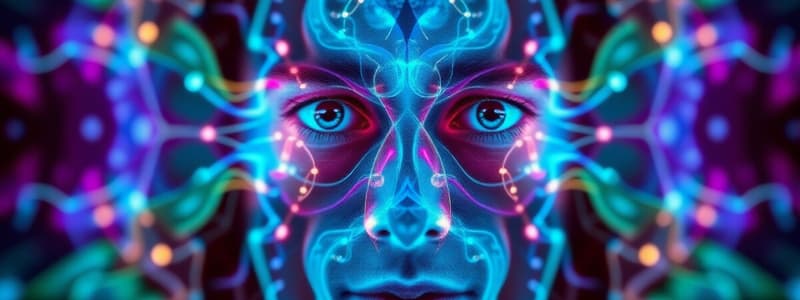Podcast
Questions and Answers
What term refers to the minimum level of stimulation required for a person to detect a stimulus 50% of the time?
What term refers to the minimum level of stimulation required for a person to detect a stimulus 50% of the time?
- Sensory adaptation
- Absolute threshold (correct)
- Just noticeable difference
- Difference threshold
Which principle suggests that our brain organizes sensory information into meaningful wholes?
Which principle suggests that our brain organizes sensory information into meaningful wholes?
- Perceptual constancy
- Bottom-up processing
- Gestalt principles (correct)
- Top-down processing
What phenomenon occurs when individuals are less likely to help someone in need when other people are present?
What phenomenon occurs when individuals are less likely to help someone in need when other people are present?
- Bystander effect (correct)
- Altruism
- Fundamental attribution error
- Cognitive dissonance
What concept explains why a person may attribute their own failures to external factors while blaming others for their failures on personal shortcomings?
What concept explains why a person may attribute their own failures to external factors while blaming others for their failures on personal shortcomings?
Which term describes the tendency to perceive moral situations as inherently fair and just?
Which term describes the tendency to perceive moral situations as inherently fair and just?
Which type of memory is characterized by the ability to recall visual information with high accuracy after only brief exposure?
Which type of memory is characterized by the ability to recall visual information with high accuracy after only brief exposure?
What is the primary principle behind the Law of Effect proposed by Thorndike?
What is the primary principle behind the Law of Effect proposed by Thorndike?
In which scenario would retroactive interference likely occur?
In which scenario would retroactive interference likely occur?
What does spontaneous recovery refer to in the context of learning?
What does spontaneous recovery refer to in the context of learning?
Which method of study is likely to produce stronger long-term retention of information?
Which method of study is likely to produce stronger long-term retention of information?
What is the main principle behind the Yerkes-Dodson Law?
What is the main principle behind the Yerkes-Dodson Law?
Which developmental stage is characterized by a child’s ability to think logically about concrete events?
Which developmental stage is characterized by a child’s ability to think logically about concrete events?
What distinguishes Bipolar disorder from other mood disorders?
What distinguishes Bipolar disorder from other mood disorders?
In the context of child development, what does the term 'object permanence' refer to?
In the context of child development, what does the term 'object permanence' refer to?
Which psychological theory emphasizes the importance of stages in moral development?
Which psychological theory emphasizes the importance of stages in moral development?
Which term describes the phenomenon where external rewards decrease intrinsic motivation?
Which term describes the phenomenon where external rewards decrease intrinsic motivation?
Which of the following best describes the sequence of the General Adaptation Syndrome (GAS)?
Which of the following best describes the sequence of the General Adaptation Syndrome (GAS)?
In which theory does Bandura's concept of reciprocal determinism play a significant role?
In which theory does Bandura's concept of reciprocal determinism play a significant role?
Freud's model of personality encompasses which of the following components?
Freud's model of personality encompasses which of the following components?
What does Dweck's mindset theory primarily differentiate between?
What does Dweck's mindset theory primarily differentiate between?
What does the all-or-none rule state about action potentials?
What does the all-or-none rule state about action potentials?
Which part of the nervous system is responsible for involuntary bodily functions?
Which part of the nervous system is responsible for involuntary bodily functions?
Which of the following best describes transduction in the nervous system?
Which of the following best describes transduction in the nervous system?
What role does the refractory period play in neural firing?
What role does the refractory period play in neural firing?
Which pair of neurons is responsible for transmitting excitatory and inhibitory signals?
Which pair of neurons is responsible for transmitting excitatory and inhibitory signals?
Flashcards
Absolute threshold
Absolute threshold
The weakest amount of a stimulus needed for detection 50% of the time.
Habituation
Habituation
The tendency to pay less attention to a stimulus that is frequently repeated.
Perception
Perception
The process of organizing and interpreting sensory information, giving it meaning.
Learned helplessness
Learned helplessness
Signup and view all the flashcards
Fundamental attribution error
Fundamental attribution error
Signup and view all the flashcards
Discrimination/Generalization
Discrimination/Generalization
Signup and view all the flashcards
Long-Term Memory
Long-Term Memory
Signup and view all the flashcards
Observational Learning
Observational Learning
Signup and view all the flashcards
Shaping
Shaping
Signup and view all the flashcards
Proactive/Retroactive Interference
Proactive/Retroactive Interference
Signup and view all the flashcards
Reciprocal Determinism
Reciprocal Determinism
Signup and view all the flashcards
General Adaptation Syndrome (GAS)
General Adaptation Syndrome (GAS)
Signup and view all the flashcards
Humanism
Humanism
Signup and view all the flashcards
Id, ego, superego
Id, ego, superego
Signup and view all the flashcards
Social Cognitive Theory
Social Cognitive Theory
Signup and view all the flashcards
Type A Personality
Type A Personality
Signup and view all the flashcards
Assimilation & Accommodation
Assimilation & Accommodation
Signup and view all the flashcards
Piaget's Stages of Cognitive Development
Piaget's Stages of Cognitive Development
Signup and view all the flashcards
Yerkes-Dodson Law
Yerkes-Dodson Law
Signup and view all the flashcards
Object Permanence
Object Permanence
Signup and view all the flashcards
What is the all-or-none rule?
What is the all-or-none rule?
Signup and view all the flashcards
What is a synapse?
What is a synapse?
Signup and view all the flashcards
What does the sympathetic nervous system do?
What does the sympathetic nervous system do?
Signup and view all the flashcards
What is transduction?
What is transduction?
Signup and view all the flashcards
What is neural plasticity?
What is neural plasticity?
Signup and view all the flashcards
Study Notes
Perception and the Senses
- Absolute threshold
- Eye anatomy: pupils, lenses, rods, cones
- Gestalt Principles of perception
- Habituation
- Sensation/perception
- Top-down/bottom-up processing
- Perceptual constancy
Social Psychology
- Altruism
- Bystander effect
- Central/peripheral persuasion
- Cognitive dissonance
- Cognitive miser
- Frustration-aggression principle
- Fundamental attribution error
- Just-world phenomenon
- Learned helplessness
- Person perception & Behavior
- Stanford Prison Experiment (Zimbardo)
- Stereotypes
Studying That Suits You
Use AI to generate personalized quizzes and flashcards to suit your learning preferences.




